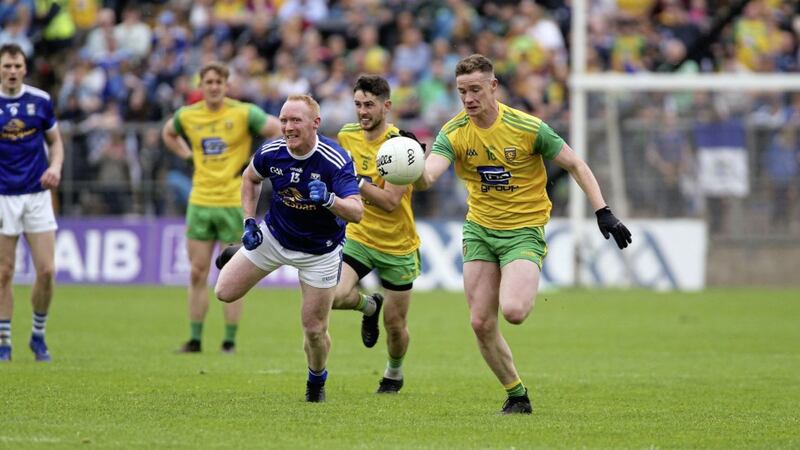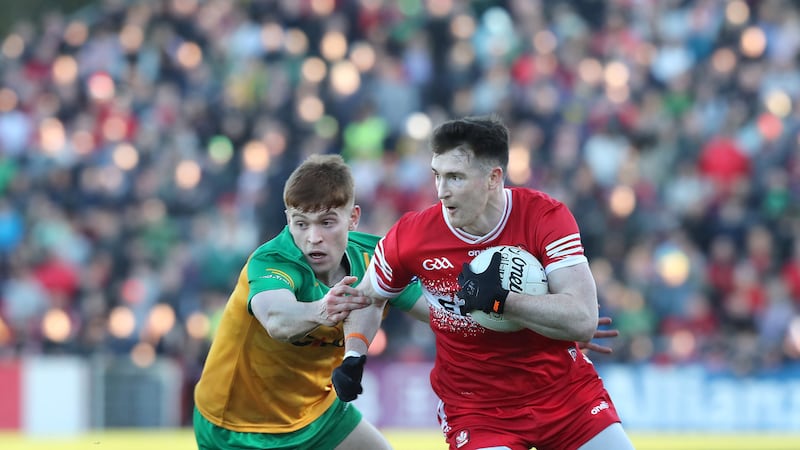LUKE Connolly had done so much to salvage Cork’s day but as the final shot left his right leg, it swung east of the posts.
Connolly had come off the bench and landed three points, among them an outstanding free and a brilliant effort from open play as the Rebels hung in the game.
And then just when it looked gone, his final effort fell short and into the waiting arms of another sub, Mark Keane, who leaned on Tommy Walsh to gobble it up at the far post.
The nudge, the finish and the broken Kerry hearts left behind were nearly as much akin to the most famous sub of all, Seamus Darby, in 1982 as the much-referenced Tadhg Murphy goal for Cork a year later.
37 years on, two Cork subs inadvertently combined to keep the county in a championship that one Kerry replacement looked to have knocked them out of.
Killian Spillane came on inside after 50 minutes and finished the night with four points from play, his straight-line enthusiasm finding joy in the tiring Cork defence.
It tied nicely into the narrative that 2020 has, so far, been the year of the sub.
In Ulster, almost every game to this point has been majorly influenced by subs.
Thomas Galligan was Cavan’s man of the match arguably twice running, transforming their performances against both Monaghan and Antrim from a half-time midfield introduction.
Niall Grimley had the same late impact in the middle as Armagh found their way out against Derry. Oisin Gallen hit the winner for Donegal against Tyrone.
Down’s pacy trio of Liam Kerr, Corey Quinn and Ryan Johnston tore Fermanagh open and took the game away in the last half hour.
And beyond Cork’s dramatics, we’ve already had Offaly’s Cian Farrell against Carlow; the match-winning two points from Robbie Smyth for Longford against Louth; Neil Flynn’s emotional and vital influence on Kildare’s win over Offaly; and Liam Boland’s two scores to edge Tipperary past Limerick.
The idea of being a sub sitting tight in the cold, wet environs of empty winter stadia might never have seemed less appealing, unless like Kevin McStay you’re around long enough to remember when there was no enthusiasm about the gig at all.
In his playing days, the starting XV carried all the significance for so many reasons.
“A lot of things went on with fellas trying to be in photographs, which were an historical document at the time. Mad stuff.
“There’s a story told of a Mayo minor selection, this particular player came out of nowhere. The voting was adding up very nicely for him and there was outrage over him being selected.
“The minute the photograph was taken and five minutes in, happy enough to sub him off.”
Attending one of the country’s most famous footballing institutions in St Jarlath’s Tuam, the notion of subs was unheard of. They picked 15 men and barring injury, that was it.
It was far from unique. Nationally, the idea of holding something in reserve hadn’t been born, never mind simply believing you had something on the bench.
“It was a different culture. If you weren’t on the 15, you were definitely separated,” says McStay.
“When you think back, sometimes the subs would be sent out to the field to empty the dressing room and make more space.
“There’s no ‘them’ in us but there was definitely a ‘them’ in ‘us’ during the ‘60s and ‘70s. Some lads didn’t even know who some of the subs were, or they’d find it hard to remember them.
“Everybody knew the top 18 or 19 players, and beyond that there was no role until it all changed maybe 15 years ago, around the time Tyrone emerged.
“There’s just more attrition, more action and everybody had a bigger pot of work to be doing. There was a massive increase in physical intensity, pushing up and tackling high, and forwards tackling as hard as backs.
“That was obviously going to drain energy levels, and as day follows night, the role of the sub had to become an issue.
“The GAA then made it five, and then six, subs and it became a massive issue. Everybody on the bus now could legitimately feel they’d get a chance.”
By the time he became Roscommon manager, the world had completely changed its view of those previously deemed as training dummies.
Dublin were perceived as setting a new bar in the middle of their five-in-a-row run, bringing on Paul Flynn, Kevin McManamon, Diarmuid Connolly, Bernard Brogan, Niall Scully and Cormac Costello in the 2017 final against Mayo.
These were unheard of levels of depth and were a key factor across their historic run of success under Jim Gavin.
Everyone else has had to work harder to manufacture that broadness of quality.
The gap in athleticism and the increased physical demands meant teams were having to utilise their six subs (now reduced to five again) more frequently and earlier.
At post-match analysis sessions, McStay’s replacements would be graded on the basis of what they contributed in the time they got on the pitch.
“I’m sure all teams have a version of it, we had this thing of ‘fill the boxes’.
“Say you maybe had 24 minutes, we’d say to them: ‘You had a big chunk of time to make an impression, show us what you did’.
“Our stats guy tagged every contribution of our subs. You’re looking at turnovers, assists, blocks, scores. We had five boxes that they had to tick. We’d put them up at the team meeting and we always looked for five green ticks.
“The subs were delighted because it put them front and centre. And nobody wanted a sheet to go up with five boxes and nothing in them.”
* * * * *
CIAN Mackey spent his whole inter-county career dreaming of marching behind the band on Ulster final day, and then when it came in his final year, he was glued to the bench in St Tiernach’s Park.
By the time the day came around for Cavan, he was no less frustrated by it, but he’d come to nearly expect the decision.
Mickey Graham took the view that he could garner a significant impact from his veteran playmaker by springing him in the final half hour of games.
His introduction in the drawn semi-final with Armagh had a huge impact. Mackey was brilliant. He came off the pitch feeling sure that he’d start the replay.
“I wasn’t tired coming off the field, I felt fresh and good for an hour of close to 70 minutes football,” he says.
“When I wasn’t starting then [in the replay], it was annoying as I was after playing 50 minutes of football and doing well.
“To be seen again as an impact again if needed was hard to take because I thought I did do enough to get a chance to start.”
The impact he made off the bench in the two games against Armagh formed a legitimate argument in favour of holding him back, but the Ulster final rapidly countered it.
By the time Mickey Graham turned to him at half-time, Cavan were 0-13 to 0-5 behind against Donegal. It was an unsalvageable wreckage for any man.
“I felt if you wanted to beat Donegal, you needed to keep it tight and be toe-to-toe with them for 50, 60 minutes and then hope everything would go your way,” says Mackey.
“Not starting that game, in my head, was frustrating because of the occasion and I didn’t think Donegal would allow me to make the same impact off the bench as I did against Armagh.
“As I came on, Ryan McHugh came on to pick me up, so they’d already planned for it.
“In my head, I thought I should have started the game because if they were putting Ryan McHugh on me, we might have nullified each other and he mightn’t have had an impact on the game.
“I just think in the big games against the big teams, you have to play your best game to make sure they can’t get momentum against you.
“Mickey could have thought his best team was the 15 he put out in the Ulster final, so I have to accept that as a possibility, but you always have to believe you’re as good as who you’re challenging to get into the team.”
By a twist of fate, Graham now has a very similar decision to make for this weekend’s clash with Down.
The impact of the aforementioned Thomas Galligan has been so pivotal in their opening two games that it would seems almost impossible to leave him out.
Despite struggling with an injury, the Lacken clubman has been their driving force in the second halves against Monaghan and Antrim.
To leave him sidelined from the beginning against Down could backfire again, or his introduction could once more propel them in a tight game. Such are the perils of management.
Graham’s style wasn’t to dress the disappointment up in individual conversations. Mackey was the same as anyone else, and he found the team out the same time as the rest.
He never sought out the conversation and it was never offered, but that wasn’t an issue.
The key was then to shoulder the disappointment and avoid becoming a negative influence on the group.
“Probably from seeing other players down the years throwing toys out of the pram, it doesn’t benefit the group of players.
“Moreso as a senior player, if I was throwing the toys out, if Oisin Pearson and those younger lads are seeing that, it’s letting them think in a couple of years they could do the same, which is not the case.
“The manager makes the decision, you have to just take it and bring your frustration home with you.”
A lot of that frustration on the part of so many men has been worked out in the last 20 minutes of this year’s championship games.
The year of the sub has more late heroes to find yet.








